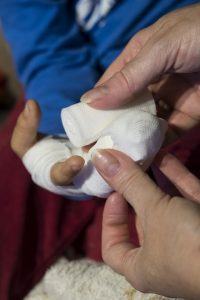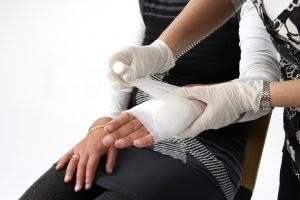Need Immediate help? Call 717-397-1010
After Hours Call / Text 717-471-2168
Need Immediate help? Call 717-397-1010
After Hours Call / Text 717-471-2168
As an employee, you’ve likely heard of OSHA, but not been entirely sure what it is or what it means to you. OSHA is the acronym for the Occupational Safety and Health Act of 1970, which was written with the specific purpose of keeping workers safe. It’s also the acronym for the agency that enforces OSHA standards. The act spells out specific requirements and standards that employers need to follow in terms of the working conditions they provide to their employees, and the goal is to avoid injury, illness and death. OSHA does more than set out rules – it also enforces them in a number of ways, including providing information, training and assistance to employees as well as to those who hire them.
Unfortunately, despite the existence of OSHA standards, workplace accidents, injuries and deaths continue to happen all too frequently, with more than 5,000 workers killed on the job in 2016 alone. Though not every fatality is a result of violating OSHA standards, many of them are. In the year 2017, the 10 most frequently violated OSHA standards were:
If it seems like construction sites appear on this list frequently, that’s because it does – in fact, more than 20 percent of worker fatalities took place on construction sites. A close analysis of the top causes of construction site accidents reveals that if employers were to eliminate the four most common causes of construction site deaths — falls, being struck by an object, electrocution and getting caught in between — more than 600 lives could be saved each year.
When an employer fails to follow OSHA standards, they are subjected to fines and penalties imposed by the government, and when those failures lead to a worker being injured or killed, they are able to file a workers’ compensation claim and may also be able to pursue other legal action. For more information, contact Vanasse Law to set up an appointment to discuss your case.
 We’ve all heard about job-related stress, but have you ever heard of anybody actually having a heart attack attributed to their work? Though most people think that only injuries like strains, sprains, fractures and concussions count as job-related injuries, it is actually quite possible for a job to lead to a heart attack, and for a worker who has suffered a job-related heart attack to file for and collect workers’ compensation. Though a work-related heart attack can happen in just about any career, there are some jobs that make workers much more vulnerable to on-the-job heart attacks.
We’ve all heard about job-related stress, but have you ever heard of anybody actually having a heart attack attributed to their work? Though most people think that only injuries like strains, sprains, fractures and concussions count as job-related injuries, it is actually quite possible for a job to lead to a heart attack, and for a worker who has suffered a job-related heart attack to file for and collect workers’ compensation. Though a work-related heart attack can happen in just about any career, there are some jobs that make workers much more vulnerable to on-the-job heart attacks.
These include:
If you have suffered a heart attack on the job, there’s a good chance that you may be entitled to file a workers’ compensation claim. For more information about your rights and the process, contact Vanasse to schedule a meeting with our workers’ compensation practice in Lancaster today.
 It’s that time of year. Office supply stores and Target have dedicated aisle after aisle to binders and crayons and backpacks, and teachers are back in the classroom, putting the final touches on their lesson plans and making sure that their classrooms are color-coordinated and ready. We all think of teachers as underpaid heroes, but few of us are aware that their profession is among the most at-risk of on-the-job injury and illnesses. Not only do a large percentage of our schools represent unhealthy environments that put teachers at risk of toxic exposure, but teachers are facing new challenges that may lead to workers’ compensation claims, including the risk of injury caused by interactions with their students.
It’s that time of year. Office supply stores and Target have dedicated aisle after aisle to binders and crayons and backpacks, and teachers are back in the classroom, putting the final touches on their lesson plans and making sure that their classrooms are color-coordinated and ready. We all think of teachers as underpaid heroes, but few of us are aware that their profession is among the most at-risk of on-the-job injury and illnesses. Not only do a large percentage of our schools represent unhealthy environments that put teachers at risk of toxic exposure, but teachers are facing new challenges that may lead to workers’ compensation claims, including the risk of injury caused by interactions with their students.
The top causes of teacher workers’ compensation claims in the United States include:
Beyond the same types of slips, trips, and strains that are seen in almost every work environment, the other major on-the-job-injury risk that teachers face comes from violence in the classroom or on campus. Roughly 25% of school employee injuries arise from interactions with students, and experts say that teachers are victimized far more frequently than the public realizes — in fact, they have indicated that the problem has reached the level of being a national crisis. A report issued by the Department of Education in 2015 indicated that injuries suffered by teachers led to more than $2 billion in losses included both lost workdays and workers’ compensation benefits.
Teachers are also exposed to a number of toxins in their classrooms, but the most concerning is the risk of exposure to asbestos. Most of America’s school buildings were constructed prior to the 1970s, and that means that asbestos-contaminated products were used in their construction. Asbestos ceiling and floor tiles and asbestos insulation are extremely common, and though they are not a concern when they are intact, as soon as those items begin to break down, there is a risk of microscopic asbestos particles being inhaled or ingested and leading to an increased risk of malignant mesothelioma, asbestosis, and other asbestos-related diseases. Other toxic exposures in schools include mold, mildew, and lead.
There are a number of actions that school districts can take to guard against the most common workplace injuries, including:
If you are a teacher or school employee who has suffered an on-the-job injury, contact us to set up a free consultation to discuss your rights.
 Working in food service can be extremely rewarding and offers a wide range of opportunities. From fast food spots to four-star restaurants and from serving or busing tables to working behind the line as a sous chef or head chef, you can earn a fair income, learn a lot, and spend time with interesting people. Unfortunately, these jobs come with risks and food service injuries are common.
Working in food service can be extremely rewarding and offers a wide range of opportunities. From fast food spots to four-star restaurants and from serving or busing tables to working behind the line as a sous chef or head chef, you can earn a fair income, learn a lot, and spend time with interesting people. Unfortunately, these jobs come with risks and food service injuries are common.
Those who work in customer-facing roles can hurt themselves reaching across tables to serve or clear. They can trip on a slippery fall, or even find themselves face-to-face with robbers. Those who work in the kitchen are subject to the risk of burns and other injuries from stoves and ovens, knives, and electrical appliances, as well as exposure to hazardous chemicals. Even the employees that work at drive-thru windows or who deliver food can end up injured on the job.
No matter what your position or how you were hurt, if you were injured while working in a food service establishment you may be entitled to workers’ compensation.
Workers’ compensation is a no-fault insurance policy that covers nearly every worker in America. It represents an agreement between employer and employee that means that injured workers will not need to file a personal injury lawsuit against their employer, and in exchange, their employer will insure them and provide compensation for medical expenses, as well as for any time needed away from work to recuperate and recover.
For those who work in foodservice, some injuries are more common than others. According to Cintas Corporation, one in every 20 on-the-job injuries occur at eating and drinking establishments, and the top four restaurant injuries are:
When you’ve been hurt on the job, you need to know your workers’ compensation rights to make sure that you receive the benefits to which you are entitled. Contact our office today to learn more.

When an employee is injured on the job, they are entitled to workers’ compensation benefits. These can provide much-needed financial compensation for medical expenses, as well as wage loss benefits in those cases where the worker’s injuries are bad enough to keep them out of work on a temporary basis or permanently. Workers’ compensation is specifically a no-fault form of insurance: the employee does not have to sue their employer for negligence or prove that their employer is to blame for their injury as the benefit is provided regardless of what the cause of the injury was. But there are some instances where a person or entity other than the employer may have contributed to or caused the injury. When this is the case, the injured worker may be able to file a third-party claim and seek additional damages for the injury that they suffered.
There are many ways that a third party outside of your employer’s control can contribute to or cause an injury. Some examples include:
Every work injury is different and needs to be assessed by skilled professionals to determine where liability lies and what actions should be taken. If you’ve been hurt on the job, you may be eligible to file both workers’ compensation and a third-party claim. To make sure you get the compensation that you deserve, contact Vanasse Law to set up an appointment to discuss your case.
 There are a lot of benefits of holding a proper Workers’ Compensation insurance policy as a company from having medical bills and at least some lost wages covered when an employee is injured at work. However, with that coverage also comes the risk of abuse by unscrupulous employees looking to rig the system. The first step to working against such abuse is to understand the types of fraud that commonly occur.
There are a lot of benefits of holding a proper Workers’ Compensation insurance policy as a company from having medical bills and at least some lost wages covered when an employee is injured at work. However, with that coverage also comes the risk of abuse by unscrupulous employees looking to rig the system. The first step to working against such abuse is to understand the types of fraud that commonly occur.
Fraud can happen at any point in the claim process, from the injury itself to claims made about the severity of the injury. Here are some common forms of fraud to look out for:
The first step in preventing fraud in Workers’ Compensation claims is to have a very clearly written company policy on Workers’ Compensation for all employees. This policy will help aboveboard employees understand the process while providing an avenue in which to inform underhanded employees that investigations and legal action will be taken to avoid cases of fraud. In that policy, be sure to let your employees know that there is an immediate need to report injuries and accidents, and that there will be no negative consequence for doing so.
Further, be sure to follow up and conduct investigations into claims. This is to ensure all aspects are accurate and are being handled, which will aid those using the system properly for those with a legitimate injury while making it more difficult for those attempting fraud. If you have been accused of fraud for a legitimate injury, you need legal representation. Contact our team today for more information.
 If you have been injured at work, it makes sense to hire a lawyer as soon as possible to ensure you get the compensation to which you are entitled. However, what should one expect when they decide to call a work injury lawyer? Understanding the information a lawyer needs before making the call can lead to a better consultation and get more out of the typically free service law firms offer to their potential clients.
If you have been injured at work, it makes sense to hire a lawyer as soon as possible to ensure you get the compensation to which you are entitled. However, what should one expect when they decide to call a work injury lawyer? Understanding the information a lawyer needs before making the call can lead to a better consultation and get more out of the typically free service law firms offer to their potential clients.
The first thing a lawyer will need is your employment information. This includes:
The amount of benefits offered to workers largely depends on the average weekly pay of a worker. Further, the marital status and number of children under the age of 18 can have an impact on a claim award. Have this information ready prior to calling a lawyer for the best idea of how successful your claim will be and what you can expect out of an award.
The accident itself can have an impact on what can be recovered in terms of compensation after an injury. Relevant information includes:
History of medical treatment has a bearing on how the claim will proceed. This information includes:
Above is the minimal information a person should have on hand when contacting a lawyer. Having correspondence with the employer or insurance company such as if you have received weekly benefits, how medical care was paid for, outstanding medical bills, contact information of any insurance agents spoken to, and any offers that have already been made on the claim are helpful when applicable to the situation. Further, any information from before the accident such as previous injuries and illness or previous Workers’ Compensation or personal injury claims can be helpful.
The next step is finding the right lawyer for your case. Contact our team today for a free consultation on your claim.
 When a worker is injured on the job, it’s difficult to be critical since they are in pain. However, having a drug test after a work injury can be crucial. While Workers’ Compensation is a no-fault system, a worker that was under the influence will not be eligible for the same benefits as an employee that was exercising proper behavior. In fact, a drug test could prevent a worker from collecting benefits at all.
When a worker is injured on the job, it’s difficult to be critical since they are in pain. However, having a drug test after a work injury can be crucial. While Workers’ Compensation is a no-fault system, a worker that was under the influence will not be eligible for the same benefits as an employee that was exercising proper behavior. In fact, a drug test could prevent a worker from collecting benefits at all.
Drug testing an employee is not always legal. This is because they are owed a certain amount of privacy. However, when an injury becomes involved, the legal stance changes a bit. In many cases, there is good reason to be suspicious, which is when it is legal to drug test an employee normally. In most cases, it can be difficult to prove there was good reason to be suspicious but having an accident that could have been avoided is one of the best ways to justify why an employee should be tested.
However, there should still be caution expressed, as illegally testing an employee will only cause worse issues when it comes to the work injury.
Hopefully, as an employer, you have considered the possibility of an injured worker prior to its happening. Additionally, it should be a consideration of how it will be handled if an intoxicated person comes to work even if they are not injured. The best thing a company can do is write a drug testing policy in their employee handbook, outlining the reasoning for drug testing and having employees sign an acknowledgment of your policies.
A drug test should happen as soon as possible after an injury. The quicker the test, the more accurate the results. After all, many drugs, such as alcohol, quickly dissipate and are difficult to prove. However, showing the person was above the acceptable BAC percentage an hour after the injury will be good evidence against the claim.
If you use a lab that is not reputable, it will be argued during the claim. Don’t count on the employee not having legal representation, as many immediately seek a lawyer after being injured on the job.
Regardless of the results of the test or if you are able to demand a test, medical care should be given as soon as possible. Even if the employee was heavily intoxicated, you still have a duty of care in ensuring they receive medical attention when necessary.
If you have been injured at work and your employer is trying to use evidence of intoxication against you, contact our team today. We understand both sides of defense and will use our experience to benefit you.
 As desk jobs become more popular as a type of occupation, injuries related to such jobs are increasing. It may sound unlikely an injury would incur while sitting behind a desk but sitting all day can have a negative impact on the body, especially considering approximately 80% of workers today work in a role that involves little or no physical activity. Straining the arms or sitting without proper support, along with fast typing, puts workers at a higher risk of injury than most consider.
As desk jobs become more popular as a type of occupation, injuries related to such jobs are increasing. It may sound unlikely an injury would incur while sitting behind a desk but sitting all day can have a negative impact on the body, especially considering approximately 80% of workers today work in a role that involves little or no physical activity. Straining the arms or sitting without proper support, along with fast typing, puts workers at a higher risk of injury than most consider.
Further, desk jobs heighten some risks for repetitive injuries. For instance, someone may develop carpal tunnel or other wrist-related injuries by continually using a keyboard every day, particularly if the keyboard is not ergonomic. While these types of injuries are not always avoidable, particularly when you have a predisposition toward development of certain conditions, there are some tips that can make your work environment much more comfortable.
If you are beginning to feel the first signs of a work injury, or are concerned about aches and pains you have been feeling, consider the following tips to help take care of yourself at work.
If you already are seeing the signs of a work injury, contact our team today for a free consultation on your claim.
 When you are injured at work, it can be a time of many emotions. First, there is concern over your health and safety. But second, there is concern over what this means for your job and what actions need to be taken following an injury that happens in the workplace. While each state has its own regulations on how things are handled, and each company has its own set of policies, there are steps that can be taken in any jurisdiction or company following an accident.
When you are injured at work, it can be a time of many emotions. First, there is concern over your health and safety. But second, there is concern over what this means for your job and what actions need to be taken following an injury that happens in the workplace. While each state has its own regulations on how things are handled, and each company has its own set of policies, there are steps that can be taken in any jurisdiction or company following an accident.
Following a work injury, take the following precautions to ensure your rights are protected:
If you have been injured on the job, you need legal representation to ensure a successful claim. Contact our team today for a free consultation on your case.